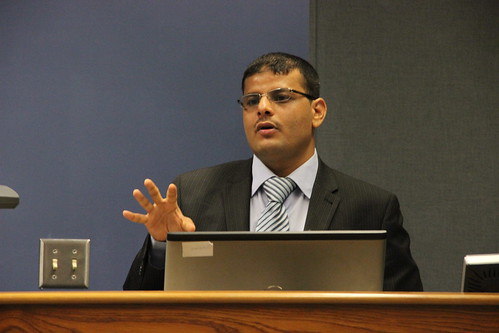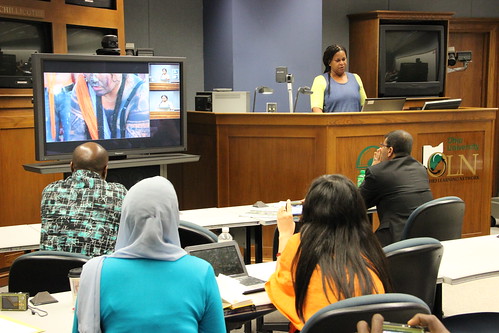By Lindsay Boyle
On Thursday, July 12, the fourth International Mass Media summer course was held in Copeland Hall at the Ohio University campus. During each class, two SUSI scholars give a lecture about their own country’s media systems, journalism practices and political cultures. All of the lectures are streamed live through Ohio University distance learning and are available online to 35 students who are taking a summer class instructed by Dr. Brook Beshah.
The SUSI summer institute — in which scholars from all over the world come to the E.W. Scripps School of Journalism at OU to study journalism and media — is funded by an annual renewable grant from the U.S. Department of State’s Study of the U.S. Branch in the Office of Academic Exchange Programs.
Dr. Murad Abdullah
Yemen
To kick off his presentation, Dr. Murad Abdullah, the scholar from Yemen, began with an overview of the Yemeni political structure.
Abdullah explained that about 16 months ago, just one man — who claimed the government was a republic — essentially ruled Yemen. During that time, Abdullah explained that news was predictable — there was no criticism of basic government policy, except for complaints about lower-level government employees.
However, in 2011, the Yemeni Revolution ultimately brought a new leader into power. In Yemen today, Abdullah explained that there are five main types of media: government-controlled, party-affiliated, international, independent and social.
The government-controlled media includes two TV channels and several radio channels, as well as some print outlets. Today, the press is used primarily as a tool of political mobilization of the public.
There are several different party-affiliated media, which are run and sponsored by political parties. Abdullah explained that those media typically target the ruling regime with heavy criticism. They publish issues directly concerning their members, and often neglect human rights issues. However, Abdullah said that party-affiliated media did play a positive role throughout the Yemeni Revolution.
Independent media in Yemen is complicated. Though there are many different TV and radio channels, Abdullah said they are often aired from elsewhere, such as London or Egypt. That is changing as the constitution, reviewed by the new government, now allows more freedom.

SUSI scholar Dr. Murad Abdullah presents a lecture that is streamed live through OU distance learning, and is available online.
Abdullah explained that there are also independent newspapers, but though professional journalists run them, parties are sometimes behind them. Such papers often tackle only certain issues and help certain parties.
Finally, there are truly independent media, which Abdullah said are preferred by the public. However, he explained that because many journalists do not know much about business management, such media often close down. Additionally, there is not always a lot of fact checking, which can lead to coverage of false information.
During the Yemeni Revolution, Abdullah said that social media were active and vibrant. Though social media did not cause the revolution, he said they did help it continue. Regardless, Abdullah pointed out that users of social media are still a minority in Yemen, and that social media can also have credibility issues.
Ultimately, Abdullah is not optimistic about the future of independent media, but is optimistic about that of governmental media. He said he believes that the latter have truly divorced from the past regime and no longer want to be the tool of a ruler. He also explained that Yemen’s new president seems genuinely willing to bring about change.
Although he prepared for his presentation one day prior to it, Abdullah said he had gathered the information for it while he was still in Yemen. For him, it was not difficult to present in front of his colleagues. However, he did mention some challenges.
“What is special about the event is that it is a new environment and a new audience,” he said. “I had the challenges of deciding how to make the information focused and concentrated to the media in Yemen, and how to give information that the audience would understand easily, as they don’t have background about the country of Yemen.”
Prof. Rachael van der Kooye
Suriname
Scholar Rachael van der Kooye, from Suriname, began her presentation with an introduction of herself, as well as an overview of her country. She explained that Suriname has a very culturally diverse population and that, for the most part, the different groups live in peace with one another.
She said that, in the past, a violent and unfriendly media culture existed in Suriname. However, that culture mostly disappeared after a nearly five-year-long civil war ended in 1992.
Suriname is a republic in which presidents are elected to five-year terms. However, the current president, Desi Bouterse, is controversial and has been accused of killing political opponents.
As far as Suriname’s media is concerned, van der Kooye explained that several TV stations, radio channels, newspapers, magazines and Internet news sites exist, and are owned by a mixture of the government, private groups and political parties.
In Suriname, multiple governmental ministries are responsible for media regulation, which includes granting licenses, dealing with legal matters and property rights, and more.
Despite the regulation, van der Kooye said that journalism suffers from many different things. Media owners rarely pay attention to quality; unprofessional conduct and propaganda are frequent; there is a lack of ethical principles, journalistic training and investigative journalism, and journalists are usually overworked and underpaid.

SUSI scholars and staff listen as scholar Rachael van der Kooye presents a lecture that is streamed live through OU distance learning, and is available online.
Additionally, the history of human rights violations in Suriname caused many journalists to be murdered or imprisoned, or to flee the country, according to van der Kooye.
Because media have been discovered as a way to gain power, influence and money, there has been an explosion of media within the past five years.
Often, journalists are politically affiliated, which disrupts objectivity and independence, according to van der Kooye. Many journalists limit themselves by simply copying press releases and by asking few or no critical questions. That occurs because those who ask critical questions can receive threats.
Suriname’s current government cultivates an image of fear not only through threats, but also through intimidation and boycotting media, van der Kooye said. Journalists are also limited in that the government does not openly provide information to them.
Ultimately, although press freedom is a constitutional law in Suriname, the majority of media operate under a system of self-censorship.
At the end of her presentation, van der Kooye warned that journalists in her country and others should remember that politicians often do not like journalists themselves, but rather the influence that journalists have.
“I don’t want to be a politician to change things, I want to be a teacher,” she said, bringing about applause from the audience.
Tuesday, July 31, 2012
International Mass Media: July 12
Topics: International Journalism, Ohio University, Suriname, SUSI, Yemen
Subscribe to:
Post Comments (Atom)



No comments:
Post a Comment